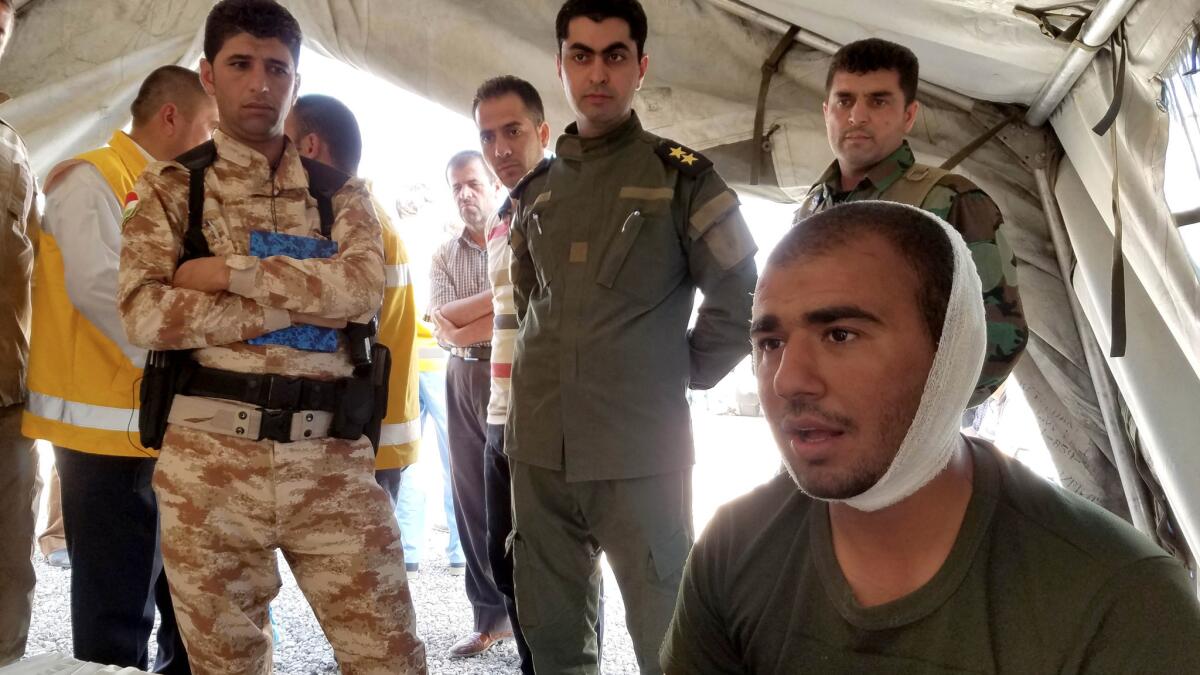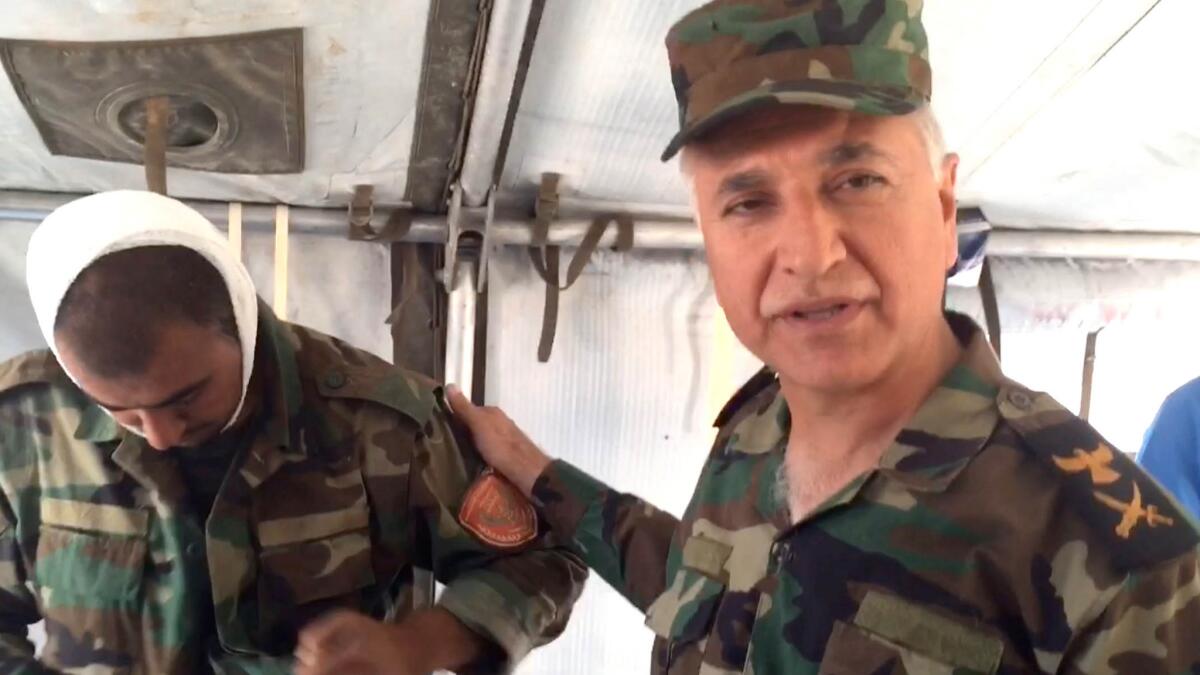Even the badly wounded are itching to return to the battle for Mosul: ‘I’m fighting for my land’
Reporting from Bashiqa, Iraq — Bleeding from the head after a mortar attack, a soldier was rushed by ambulance Sunday from the front lines of the battle for Mosul to a cluster of roadside field hospital tents several miles away.
Within moments of arriving, Araz Ahmed Sharif was talking about rejoining the fight.
A doctor explained to Sharif, a 21-year-old Syrian Kurd, that he had a piece of shrapnel lodged in his scalp. But as nurses wrapped gauze around his head, Sharif — a member of the Kurdish special forces — insisted on leaving. He pushed aside his undershirt to expose the tattoo above his heart: Kurdish President Massoud Barzani.
“I’m fighting for my land,” Sharif said before climbing off a cot and into a waiting ambulance that took him back down the winding mountain road to battle.
Kurdish forces, known as peshmerga, are at the forefront of the fight to reclaim Mosul from the Islamic State group, and have suffered scores of casualties since the offensive began a week ago. But at this field hospital near where the offensive started and still raged Sunday, even those seriously wounded insisted on returning to the front lines.

The doctor was unfazed. “Sometimes there will be two injured in the same family and they want to go back and fight. It’s normal for us as peshmerga,” said Maj. Gen. Muhsin Rashed Zangana, the Kurdish government’s director of medical affairs.
Zangana was wounded two years ago in a suicide bomb blast while fighting Islamic State to the south of Mosul. Many of those he treats have been wounded two or three times before, including an amputee he recently treated for a chest wound.
The wounded Sunday included Jager Taha, 20, a third-generation Kurdish fighter with a piece of shrapnel lodged in his left shoulder. Taha sat still long enough for nurses to bandage his shoulder, then left with a fellow soldier to grab a shower and lunch of rice and beans at a nearby chow hall before returning to the front line.
“It’s an honor for me,” he said of continuing the family tradition.
Zangana declined to say how many Kurdish and Iraqi troops have been injured and killed since the Mosul offensive started. He wouldn’t say how many field hospitals were treating the injured, but stressed that the Kurdish ones he supervises treat all soldiers, including Iraqi troops and Islamic State militants.

Doctors at the Bashiqa field hospital, about eight miles northeast of Mosul, said they have treated 93 people, 17 of whom died, including two on Sunday. Most were killed by land mines, they said.
They have a staff of about 60, a fleet of two dozen ambulances and four helicopters waiting on a nearby hill to fly the wounded to hospitals an hour away in Irbil.
Kurdish commanders said Sunday’s offensive in Bashiqa was successful, securing the northern route into Mosul, which they would continue to sweep as the Iraqi army advanced.
But Zangana still worried about suicide attacks. On Sunday, there were five.
Other doctors at the field hospital said they were well supplied, but Zangana disagreed. They were running short on tourniquets, he said — sometimes, they have to use shoelaces. Their helicopters were borrowed from a traffic unit, and not equipped with medical equipment – inside one, they had to jury-rig an oxygen tank.
The military doctor feared they were unprepared should Islamic State stage chemical weapons attacks in Mosul, a city of 1.2 million. The extremists could release noxious mustard gas, he said, or target industrial chemical facilities such as the sulfur plant they destroyed to the south of Mosul last week, releasing a toxic cloud.
Doctors in the field are not equipped with protective suits or decontamination tanks, he said. All they will be able to do is wash soldiers off, and send them back to the fight.
Most of the soldiers who were pronounced dead here did not survive the ambulance ride to the field hospital, Zangana said, having suffered trauma from suicide bombs, gunshots to the head and mortar strikes.
Among them was U.S. Navy Chief Petty Officer Jason C. Finan, 34, of Anaheim, assigned to an explosive ordnance disposal mobile unit that had been assisting the peshmerga. Thursday, Finan – a 13-year veteran of previous conflicts in Iraq and Afghanistan - was brought in unconscious with a head injury. He’d been with Kurdish soldiers injured by an explosion, Zangana said.
“I tried with the help of the team to treat him but I couldn’t do anything. We did our best by CPR, intubation, oxygen,” the doctor said, but Finan wasn’t breathing and could not be saved.
The five injured Kurdish soldiers also died, as did six more brought in afterward, Zangana said.
Finan’s interpreter, also injured in the blast, survived. When Zangana checked on him, the interpreter had only one question: “What about Finan?” The doctor broke the news.
At first, the interpreter couldn’t accept it, asking, “Nothing can be done?”
Zangana was shaken, too. He’s accustomed to seeing Kurdish soldiers die for their country. But it disturbed him to see an American killed.
As he spoke, two SUVs pulled up, covered with mud, and what appeared to be U.S. coalition forces climbed out for a pit stop. (They declined to comment to an American reporter.)
Finan was the fourth U.S. service member and the third Californian killed in the conflict against Islamic State since President Obama authorized military action and sent troops back to Iraq two years ago.
To Zangana and those at the field hospital in Bashiqa, Finan will always be a peshmerga. “We will never forget him,” he said.
ALSO
As Iraqi government forces close in on Mosul, Islamic State tries to create a diversion
Facing Iraq government-led Mosul offensive, Islamic State extremists strike back
The battle for Mosul: How to free 1 million residents without killing them
More to Read
Sign up for Essential California
The most important California stories and recommendations in your inbox every morning.
You may occasionally receive promotional content from the Los Angeles Times.










